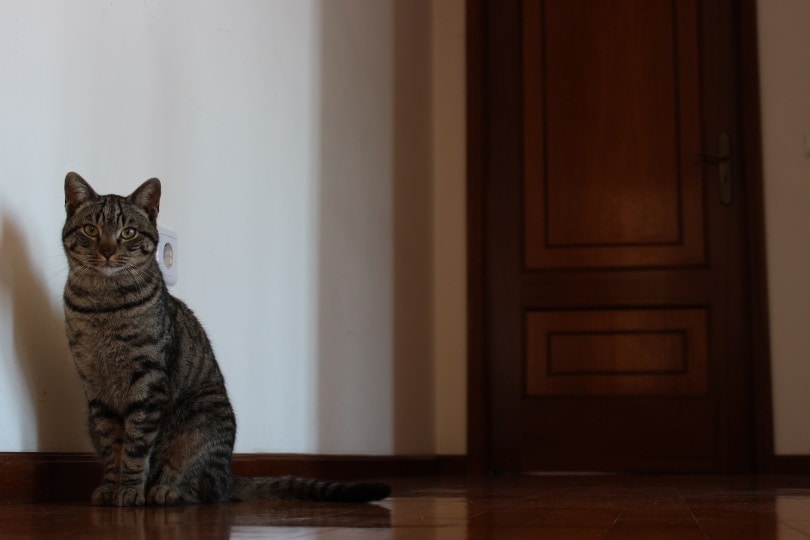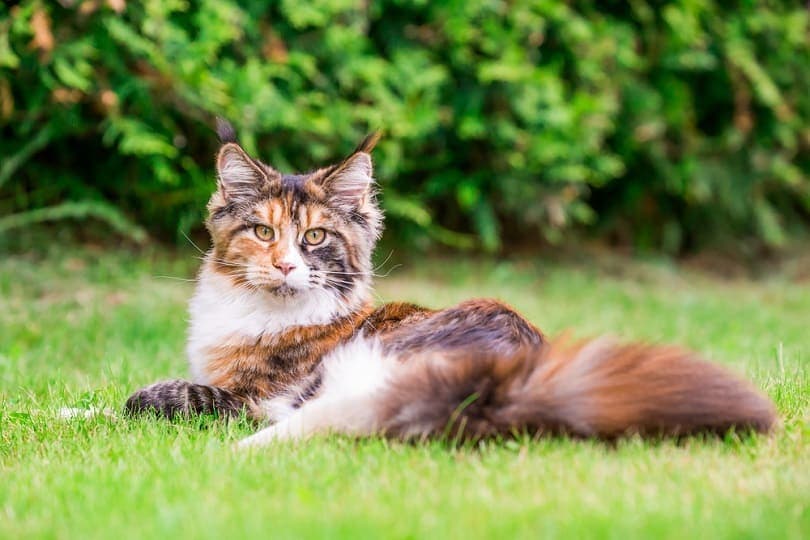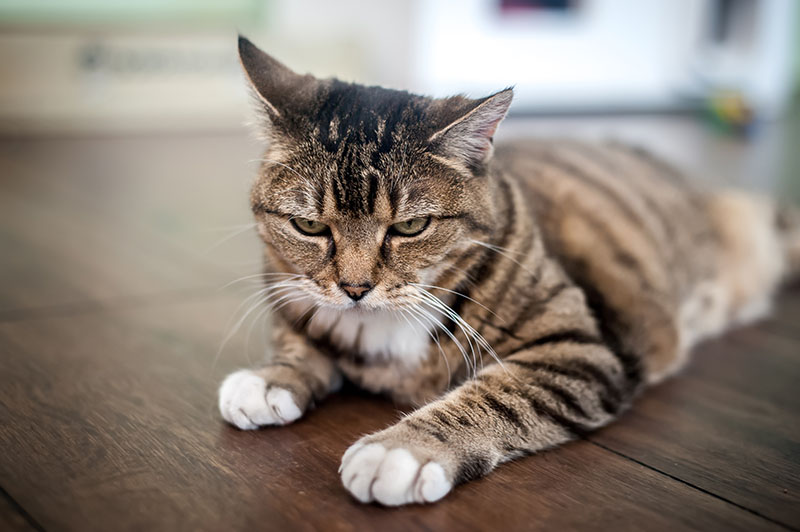How to Stop a Cat From Scratching the Door (11 Tips & Tricks)

Updated on
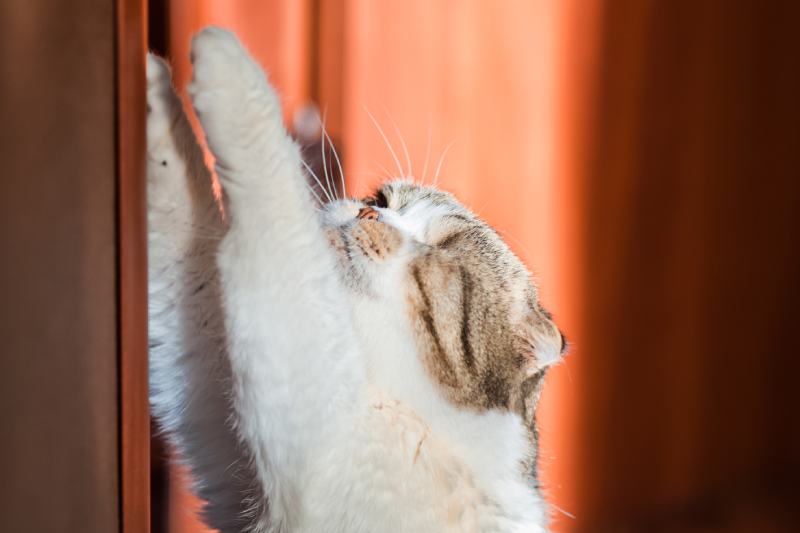
Cats are born to scratch, yet while nearly all cat owners can endure the odd scratching accident, persistent scratching on the door is another matter entirely. “Inappropriate” scratching can cause distress for the owner and the cat, cause sleep loss if the scratching is at the bedroom door, and can cause damage to the door and its frame. This article will look at 11 ways to prevent your cat from scratching at the door and what to do to ensure they don’t cause damage to your home.
Why Might My Cat Be Scratching at the Door?
If your cat regularly scratches at your door, there are two main reasons they may be doing so: because they want in or are trying to get your attention. The first reason a cat might be scratching at the door is that they want to enter the room. They may want to spend time with you, have a favorite sleeping spot within the room, or want to explore. Cats are creatures of habit, so if they want something in the room, they’ll usually try everything they can to get it.
The second reason they may be scratching is that they’re trying to get your attention. If it’s dinner time or there’s something they need to alert you about, they’ll make noise to get you to notice them.
Paying attention to your cat and watching their usual behavior can be the clue to understanding why they’re scratching at the door. But sometimes, it may be for no reason other than the cat wanting a good stretch or to sharpen its claws.
How to Stop a Cat From Scratching the Door
1. Provide Entertainment
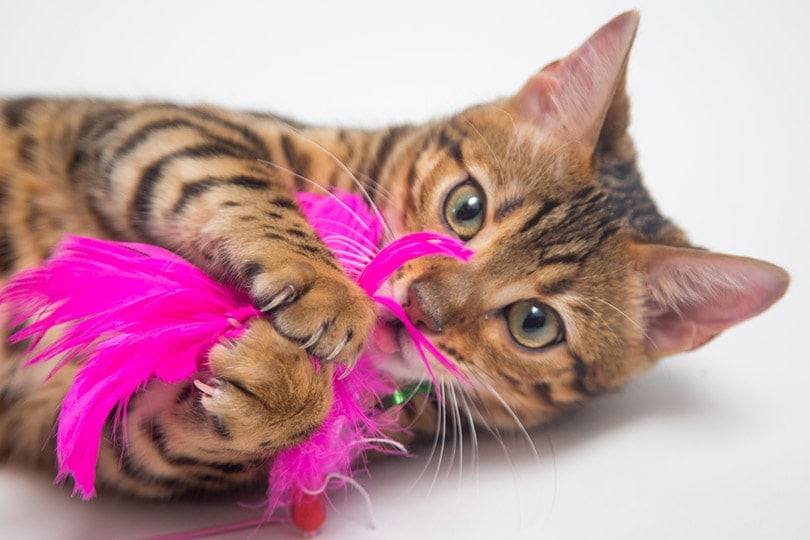
Sometimes, the simplest reason is the answer; your cat might be bored and looking for entertainment. If your cat doesn’t have adequate entertainment in the form of toys, scratching posts, or other pets, they’ll likely act up out of boredom. This includes scratching. If the door is closed and you’re behind it, they’ll scratch it to get to you if you’re their only source of entertainment.
Having a rotation of toys available for your cat that you can switch out every few days can make all the difference. For example, boredom-busting toys like feather chasers or puzzle feeders can keep your cat entertained for hours. This means they’ll be less reliant on you for amusement, and you get some peace.
2. Give Them Enough Scratchers
Scratching is a natural, innate behavior for cats. However, a lot of the time, it is not something they can control. If no suitable scratching surfaces are provided, your cat will find something else that feels good to scratch on.
Providing scratching posts or cardboard scratchers around the home can stop your cat from scratching at a tempting doorframe. Cardboard scratchers on the floor are particularly good for older cats or cats with joint problems, and they still offer a good scratching surface and a stretch.
3. Check That They’re Not Hungry
If your cat is usually fed a little earlier in the evening, it may be hungry come bedtime. This is because cats are hunters; they don’t eat all of their food at once (usually). In their natural habitat, they will eat little and often as they catch prey, which is true for most cats. If your cat has run out of food, it will scratch at the door to try and get your attention so you can feed them.
If they eat dry food, sprinkling a little around the room can act as a treasure hunt and keep them entertained while ensuring they don’t go hungry. Feeding them later or using a timed feeder can also help. Readjusting your cat’s mealtime to before you go to bed can keep them from bugging you through the door due to hunger.
4. Leave the Door Open
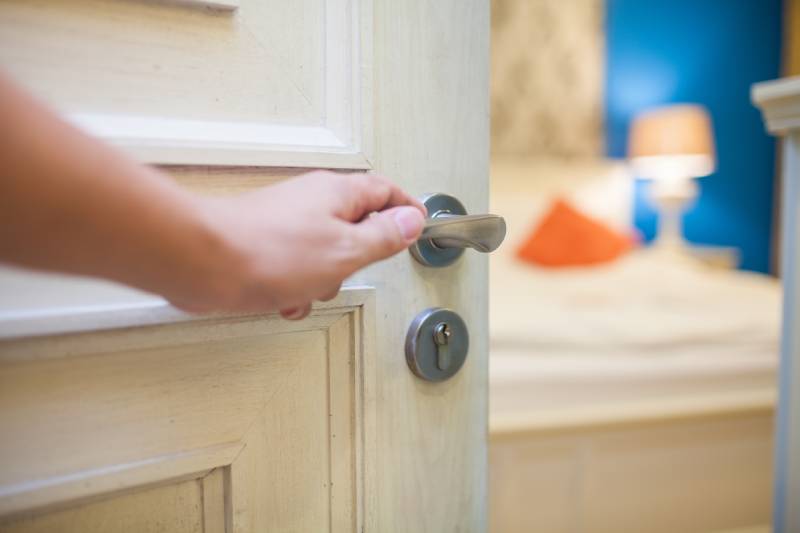
If your cat has no other reason to scratch other than that they miss you, consider leaving the door open. If it’s safe to do so, an open door can invite them to snuggle up to sleep with you.
If your cat can’t seem to leave you alone or gets stressed when you’re not home, it may be suffering from separation anxiety. If you suspect your cat is experiencing separation anxiety, speak to your vet; they can give you advice and guidance.
5. Give Them Their Own Space
Creating a room your cat can own is a good way to keep them away from your door. A room that uses vertical spaces, such as windowsills, strong shelves, and cat trees, can help your cat feel safe and comfortable, as cats like to be at a high vantage point.
Windows are also great for cats, and most like to sit and watch the world go by. If you have a room with a window your cat can spend time in, ensure it is secured and closed at all times since high-rise syndrome (injuries caused by falling from a height) is possible.
6. Ignore Them
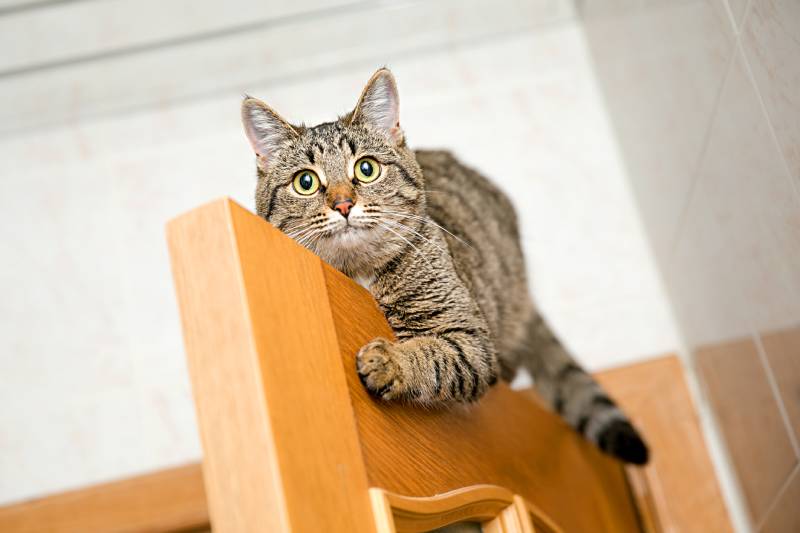
If you have tried other options and provided everything your cat needs and wants, you may need to ignore them. If your cat isn’t causing damage by scratching, it may be best not to give them the attention they want.
Scratching can be an attention-seeking behavior with no real reason other than “because it gets a reaction,” so not giving them any reaction or attention when they scratch the door can be effective.
They’ll soon realize that the time and energy needed to scratch persistently is no longer yielding results, so they will go off and find something else to do. Be cautious about sudden changes in your cat’s behavior, however, as this may indicate an illness.
7. Use catnip
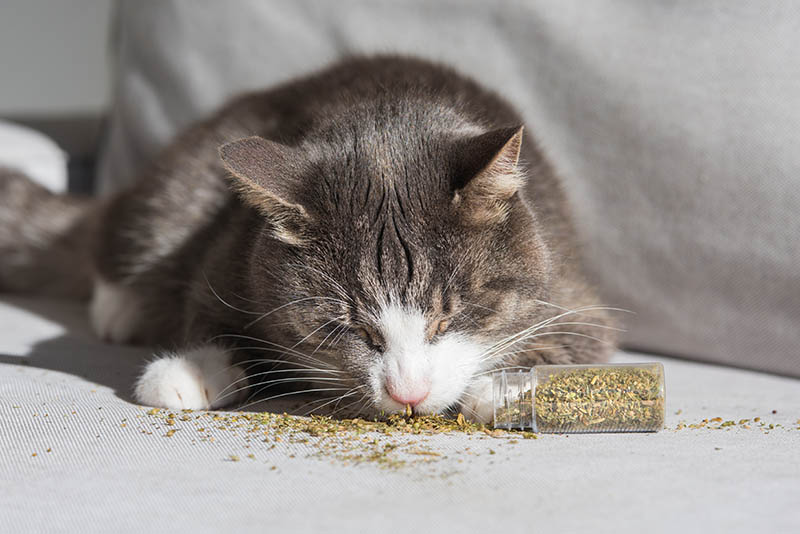
Catnip(Nepeta cataria) is well known for making some cats act silly and crazy. If your cat reacts to catnip, sprinkling a little in an area away from the door can offer an irresistible distraction. It can also prevent your cat from scratching the door.
This works particularly well when combined with a kicker toy, as your cat will have an outlet for the crazy energy catnip can provide. If your cat isn’t reactive to catnip, dried silvervine (Actinidia polygama) or valerian (Valeriana officinalis) are two other herbs that can produce similar euphoric and calming effects on cats.
8. Provide A Calming Environment Elsewhere
If you believe your cat may be scratching due to stress, consider creating a zen space for them elsewhere in the home. There are several things you can do to create a relaxing haven for your cat, all of which are relatively inexpensive:
Cardboard box
Providing a cardboard box is an inexpensive and effective way to help your cat feel calm and secure in their space. Cats like to feel enclosed as it helps them feel in control of their environment.
A box roughly the size and dimensions of your cat is the best bet, as it can provide that sense of being enclosed that cats like. There are DIY cat houses made of cardboard available to purchase that do the same thing, but any clean, dry box (free of stapes or strings) will suffice.
Pheromone diffuser
Pheromone diffusers such as Feliway can help your cat feel secure. They work almost like air fresheners but without the smell. Cat-appeasing pheromones are aerosolized by the diffuser and use the same pheromones that happy cats rub onto each other and items in their homes.
Vertical space
As mentioned previously, cats like to be up high. This height means that they can survey much of their surroundings, and it keeps them out of any perceived danger. A well-placed and secure shelf can help your cat feel safe and in control.
Radio
Lastly, leaving the radio on a calm talk show or a classical music station can help your cat to relax, as sometimes the sound of human voices or gentle music can reassure them that they’re safe and not alone.
9. Try a Door Covering
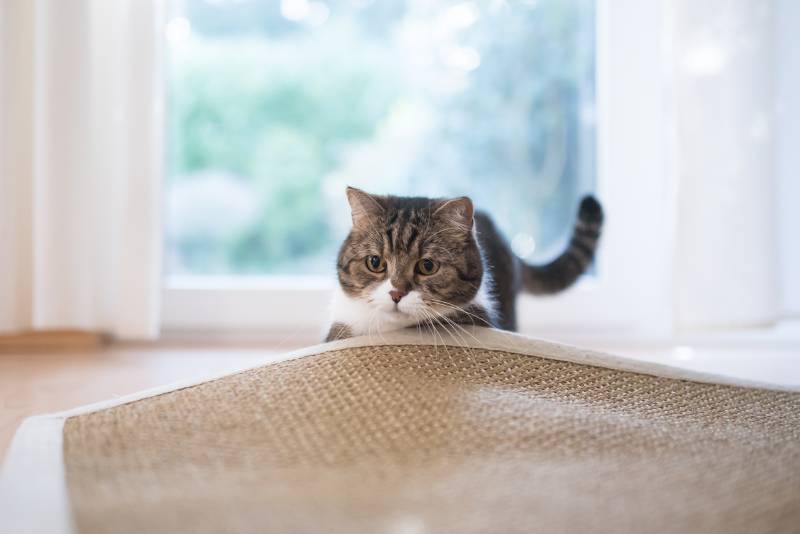
If your cat is persistent, a door covering can greatly help. This can come in many forms, with some owners opting for sisal cat scratching surfaces hanging on the door or trying a specially designed cover (usually reserved for dogs).
Attaching sisal boards to the door can either completely fix the problem by providing the perfect surface to scratch on, or it can reinforce the behavior we’re trying to remedy! If you’re not certain, trying a door covering designed to stop dogs from causing damage to doors and doorframes can offer complete protection from even the most persistent of scratchers.
10. Wear Them Out Before Bed
Cats are crepuscular, meaning they’re typically more active at dawn and dusk. Because of this, many cats get the “zoomies” around these times. To combat this, playing active games with your cat just before bed can stimulate them and burn off some of that energy.
11. Try A Nail Trim
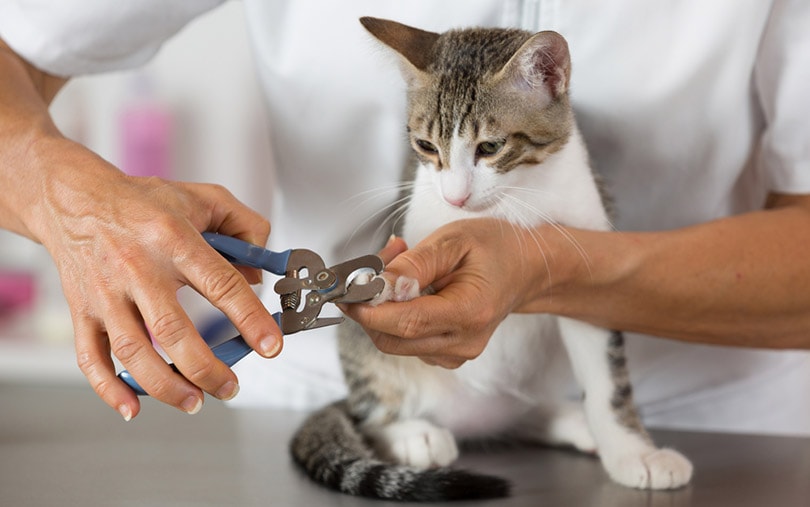
If your cat doesn’t stop scratching at the door, a nail trim may temporarily prevent damage to the door and the frame. A cat’s nails are sharpened by scratching, so they can get progressively sharper as they grow. This, in turn, can cause a surprising amount of damage to doors, and clipping your cat’s nails (or taking them to the vet or groomer to get them cut) can effectively minimize any damage.
While there are nail coverings available, they aren’t a good idea. A cat’s nails are “unsheathed” by stretching their toes out in a certain way; if claw coverings are stuck on, the cat can no longer fully retract them, and their toes are stuck in a permanently extended position. This can be painful and distressing, so clipping the claws is a much better (and more ethical) choice.
Overgrown nails can cause all kinds of problems for your cat's paws. Our Hepper Cat Nail Clipper Set includes everything you need to keep your cat's nails safely trimmed. It includes two sizes of stainless steel clippers complete with ergonomic handles and built-in safety guards. This set is perfect for all ages, sizes, and breeds of cats!
Should my Cat Be Declawed if They’re Scratching at the Door?
Cats need to scratch to live happy, healthy lives; if they can’t, physical and psychological problems can occur. Declawing is a mutilation procedure that’s banned in the UK amongst other countries and involves amputating the last portion of each of a cat’s toes, taking bone, tissue, and claw.
While this effectively stops scratching altogether, it’s often seen as unethical and cruel, and two states in the US (New York and Maryland) have banned the procedure. Declawing a cat frequently causes constant and irreversible pain to the cat and takes away their ability to perform a behavior their brains are hard-wired to express.
Conclusion
Cats are scratchers by nature, but that doesn’t mean you have to abide by their rules. Finding out why your cat is scratching at the door is the first step to take when stopping it. Exploring options such as relaxation rooms and additional scratchers are the next steps. There is a solution to the problem that you and your cat will find agreeable, resulting in you both being happier.
See also:
- Why Do Cats Hate Closed Doors? 6 Possible Reasons & Tips
- How to Stop a Dog from Scratching Doors: 9 Simple Practices
Featured Image Credit: SoNelly, Shutterstock


